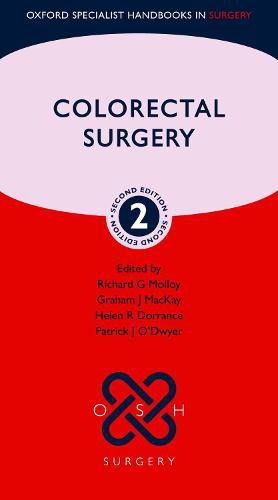Readings Newsletter
Become a Readings Member to make your shopping experience even easier.
Sign in or sign up for free!
You’re not far away from qualifying for FREE standard shipping within Australia
You’ve qualified for FREE standard shipping within Australia
The cart is loading…






Colorectal Surgery, second edition, is the essential guide for general surgical trainees preparing for the FRCS examination, as well as a quick-reference for clinicians working in the field. Providing a concise and evidence-based overview of colorectal surgery, this resource covers the diagnosis, management, and treatment of colorectal conditions. Extensively updated to reflect recent innovations in surgical practice, this edition covers new topics such as robotic surgery, complete mesocolic excision, capsule colonoscopy, and the role of qFIT in lower GI investigations. The oncology and inflammatory bowel disease chapters have been revised to reflect new understanding of the genetic aspects of IBD as well as novel therapeutic agents. Management of benign colorectal disease has also been revised to reflect current approaches to rectal prolapse and haemorrhoidal disease including updated guidelines for functional bowel conditions.
$9.00 standard shipping within Australia
FREE standard shipping within Australia for orders over $100.00
Express & International shipping calculated at checkout
Colorectal Surgery, second edition, is the essential guide for general surgical trainees preparing for the FRCS examination, as well as a quick-reference for clinicians working in the field. Providing a concise and evidence-based overview of colorectal surgery, this resource covers the diagnosis, management, and treatment of colorectal conditions. Extensively updated to reflect recent innovations in surgical practice, this edition covers new topics such as robotic surgery, complete mesocolic excision, capsule colonoscopy, and the role of qFIT in lower GI investigations. The oncology and inflammatory bowel disease chapters have been revised to reflect new understanding of the genetic aspects of IBD as well as novel therapeutic agents. Management of benign colorectal disease has also been revised to reflect current approaches to rectal prolapse and haemorrhoidal disease including updated guidelines for functional bowel conditions.